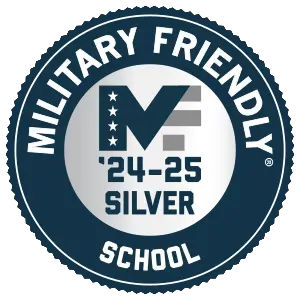Trade School vs. Traditional College: Making the Best Choice for Your Career
 There’s a lot of pressure on students to head straight to a 4-year traditional college, but that’s only the answer for some. Did you know that trade schools offer educational opportunities that take less time, focus on trade skills, and provide hands-on training? So, what is a trade school?
There’s a lot of pressure on students to head straight to a 4-year traditional college, but that’s only the answer for some. Did you know that trade schools offer educational opportunities that take less time, focus on trade skills, and provide hands-on training? So, what is a trade school?
What is a Trade School?
A trade school, also known as a vocational or technical school, focuses its curriculum on a specialized trade. They are a post-secondary educational institution that prepares you for jobs in the real world. Trade schools offer career-focused programs and hands-on training, and you graduate with a certificate or diploma that prepares you for immediate employment.
What are the Disadvantages of Attending a Traditional College?
There are some disadvantages to attending a traditional 4-year college. These disadvantages include:
Additional Time
Do you have four years to get a degree that may or may not get you a job in this workforce? Only some people can be out of the workforce for that long. Trade schools can be completed in 1 to 2 years. You get a complete education and start working in less time than finishing your general education courses at a traditional college.
Unfocused Curriculum
Traditional colleges offer a broader range of academic programs with dozens of majors and concentrations. The curriculum is extensive but less specialized than a trade school. Career goals are rarely decided before graduation at a traditional college.
Student-Instructor Relationship
You may only get a little time to talk with your instructor at a traditional college. They may have limited office hours or teachers’ assistants who take questions. Why? Traditional college instructors must teach to the masses, leaving behind individuals who are struggling.
Failure to Finish
Almost 56% of students who attend a 4-year college drop out before completing their degree. On the other hand, trade schools have a much higher graduation rate. Plus, a trade school offers career services, giving you a much better chance of finding a job after graduation.
Large Class Sizes
University lecture halls at traditional colleges can seat 200 students. It’s easy for you to get lost in the shuffle. Trade school classes are smaller, allowing instructors to provide personalized instruction. Everyone can participate, and everyone benefits.
What are the Benefits of Attending a Trade School?
Trade schools know how to prepare you for the job market. They have been helping students gain valuable education and training to start new careers. Trade schools understand that you need classroom lectures as well as hands-on experience. Whether you are a practical nurse learning to take vital signs or a truck driver learning to drive a big rig, you will get the knowledge and experience you need to succeed in your new trade at a trade school.
A Quick Start
Trade school programs get straight to the point, covering the skills you need to succeed in fields like medical assisting, HVAC, electrical applications, practical nursing, medical assisting, truck driving, real estate, and business administration. You’ll leave the classroom quicker than a traditional college, ready for a rewarding career. The programs offered at Ohio Business College include:
Medical Assisting – a 12-month diploma program that prepares you for a career working in a medical office or facility. During this program, you will gain exposure to subjects including human anatomy, pharmacology, record keeping, clinical and administrative procedures, medical law and ethics, and phlebotomy.
HVAC/R – our 12-month training program will prepare you for an entry-level HVAC/R technician position. The HVAC/R training program consists of 64 credit hours and combines the crucial knowledge of textbook learning with practical hands-on learning experience.
Electrical Technician – a 9-month diploma program that prepares you for an entry-level position as an electrician. This program provides the skills and services needed in the various settings you will work in, including residential, commercial, and industrial. You learn theory in the classroom and then apply those skills in a lab setting, including installing and maintaining electrical wiring, transformers, a/c and d/c motor control circuits, instrumentation, and programmable logic controllers.
Practical Nursing – a 12-month diploma program that combines theory, nursing skills lab, simulation lab, and clinical experiences. Once you graduate from the LPN program, you will be fully qualified to take to the NCLEX-PN to become licensed as an LPN in Ohio.
Truck Driving – a 4-week certificate Class A CDL Truck Driving program offered at our Dayton and Columbus, Ohio campuses combines applied textbook knowledge with valuable time behind the wheel to ensure you’re ready to drive America’s roadways.
Accounting & Business Management – a 24-month Associate’s degree program where you will learn the essential skills necessary to be successful in starting your own business or keeping the books in someone else’s.
Business Administration – a 12-month diploma or 24-month Associate’s degree program, preparing you for a career in banking, human resource management, retail, and administration. During this program, you’ll gain vital foundational skills in communication, management, accounting, law, and technology to teach you how to combine business knowledge with human insight to make informed decisions and build more effective business processes.
Office Administration – a 24-month Associate’s degree immerses you in subjects and skills such as software applications, decision-making, interpersonal skills, word processing, and office support.
Real Estate – a 3-month certificate offering evening classes designed to teach you what you need to know to sit for the Ohio Real Estate Associate Exam.
Hands-on Training
If you learn by doing, you’ll appreciate a trade school’s hands-on approach to training. You’ll learn in laboratories and workshops, familiarizing yourself with the tools of the trade while building real-world skills. At a trade school, you will receive one-on-one guidance from experienced instructors who demonstrate techniques and provide step-by-step instructions. Plus, you can work directly with the tools, equipment, and materials relevant to your chosen field, refining your skills and techniques.
Instructor Mentorship
Class sizes in trade programs are smaller than in traditional colleges, allowing for more personalized attention from instructors. Instructors know what employers are looking for and can help you succeed. As mentors and educators, your instructors will bridge the classroom and workplace gap. After completing your trade program, you’ll be ready to transition from student to trade professional.
Networking Opportunities
During your trade program, you will meet many instructors, classmates, and trade professionals who will help you network to find a job after graduation. Networking can be the best way to stay employed. Keeping up with classmates and instructors will keep you connected so you can reach out and ask for career advice.
License and Certification Preparation
Licenses and certifications are the key to career advancement. They demonstrate the professional competency employers are looking for. Trade schools prepare you for certification opportunities by putting relevant topics into the curriculum. Every credential you earn enhances your qualifications, professional credibility, and marketability.
Flexibility
Many trade schools offer flexible schedules for students with other responsibilities outside school. Trade schools offer day and evening class structures that allow you to care for your family or work a job while they go to school.
Accessibility
Trade schools are more accessible to the average student. Whether you’ve just graduated from high school or want to retrain for a second career, there are fewer trade school enrollment barriers. Trade school admission criteria are less stringent, with flexible deadlines and reasonable academic requirements.
Career Services
Did you know that trade schools do more than offer classes that can prepare you for a career? A department is also devoted to helping you find a job after graduation. Whether it is resume building, mock interviews, or job fairs, trade schools are determined to help you find the right job for your talents. After all, you mainly enrolled in a trade school to get a job.
Final Thoughts
Education should empower you. Traditional colleges are rarely lifestyle-friendly. Interest in trade school programs is growing because they provide a robust path forward for those with big dreams. Education is the key to success in any industry. The more you know, the further you go.
Want to Learn More?
If you are interested in a trade program, let Ohio Business College answer any questions you may have. Contact us today to learn more about our trade programs.

